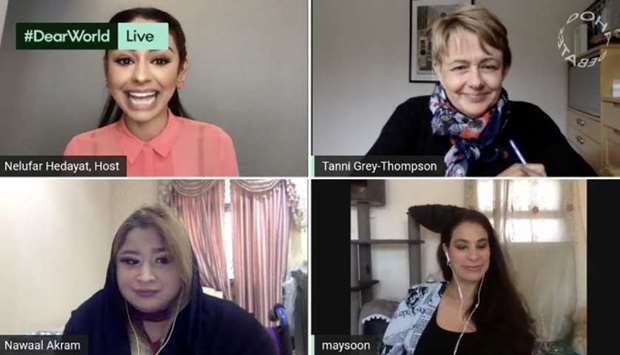Disability rights advocates from the Middle East, the US, and the UK fear public attitudes toward people with disabilities have hardened during the Covid-19 pandemic, but the crisis is also showing how technology can make the world more inclusive, Qatar Foundation’s Doha Debates has heard.
The barriers and perceptions that people with disabilities have to overcome in a coronavirus-dominated world were tackled in the latest edition of #DearWorld Live, a weekly online discussion show that focuses on the different ways Covid-19 is affecting people’s lives. The episode saw comedian and writer Maysoon Zayid – who has cerebral palsy and has championed equal access to education for children with disabilities worldwide – claim that coronavirus is “twice as difficult” for people with disabilities, saying: “First, we tend to be placed in the category of ‘medically vulnerable’ or having ‘underlying health conditions’, and second, accessing healthcare is nightmarish, with symptoms often being dismissed – especially mental health issues.
“There have even been conversations about whether the lives of people with disabilities are worth saving – imagine what that does to the morale of our community. The perception that we have a lower quality of life is demoralising, dangerous, and even terrifying. Too many disabled people have been convinced that they are a burden and their lives are not worth living.” According to Qatar-born comedian, model, athlete, and disability rights campaigner Nawaal Akram, global society must avoid “putting new barriers in the way of people with disabilities” while battling Covid-19, but added: “We also have people’s attention on social media, and if we want to raise a campaign or topic, people are seeing it.
“People don’t need to have a disability to champion disability rights. Anyone can do it, and everyone should be aware of it – because we matter.”
The episode also heard from Tanni Grey-Thompson, whose athletic career saw her win 16 Paralympic medals, including 11 golds. She now sits in the UK’s House of Lords as an independent peer, focusing on issues including disability rights and social welfare.“People with disabilities don’t have equality, and coronavirus is showing that some of the things we thought we did have are under threat,” she said.
“With this pandemic, people with disabilities are often not allowed family members in with them if they go into hospital, and very often it’s those family members who are fighting for their rights even then. So there is a real fear that they won’t have anyone standing up for them.
However, she agreed that the lockdown has shown what technology can achieve, and that lessons can be learned from this. “We’ve been asking for technology to be used for things for years, and have been told ‘we can’t do it’,” she said. “I never thought I’d see the House of Lords go online, and if you can do that with one of the oldest institutions in the world, you can do it elsewhere.

..
